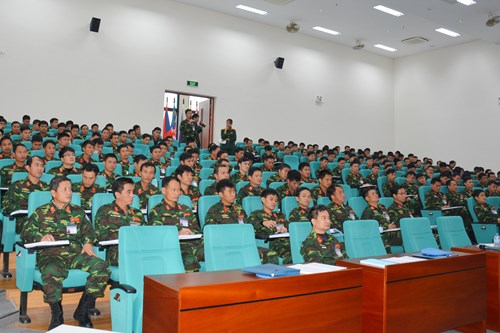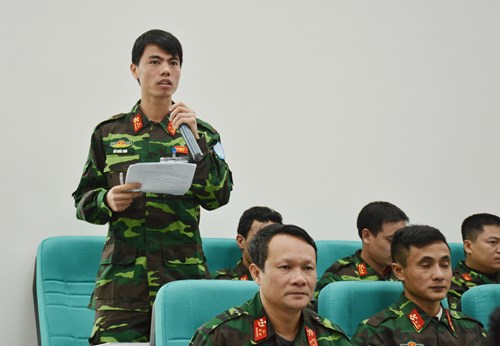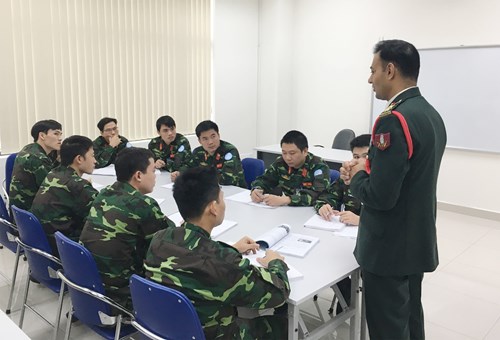During the fortnight-long course, the Indian instructors equipped the Vietnamese trainees with an overview of UN peacekeeping operations, specific duties involved in peacekeeping operations at UN missions, tasks of engineers in peacekeeping operations, and practices in realistic situations at UN missions, said Lieutenant Colonel Truong Anh Tuan, who is in charge of the center’s education and training sector.
According to Indian instructors, the Vietnamese engineers were active in classes, especially in discussions. “We have to further study our lectures and prepare more realistic situations before the next classes to clear up questions raised by the Vietnamese trainees. Through discussions, we also learned some good ideas from the students on how to deal with assumed situations. We highly appreciate their contributions and learning manners,” said an Indian instructor.
    |
|
| Clip: Vietnamese trainees with an Indian instructor at the studying room |
Beside working sessions at the center’s hall, the Vietnamese trainees were divided into syndicates for specific discussions. The Indian instructors gave them assumed situations which might happen at a UN mission. The syndicates had time to discuss together, presented their points of view and measures to address those situations, and answered questions from the instructors and also their peers from other syndicates. This teaching methodology helped students learn more knowledge and accumulate experiences from each other.
Captain Nguyen Manh Cuong shared that they felt highly enthusiastic in discussions. “Though we have not known much about UN peacekeeping operations so far, lectures on tasks of engineers in peacekeeping operations are quite close to what they have performed in our units previously. Hence, we could exchange and contribute our realistic experiences and knowledge to all studying sessions,” he said.
Cuong also added that the Indian team included four experienced experts, who once participated in and commanded Indian military engineer units in performing tasks at UN peacekeeping missions. Thus, their experiences shared at the course were realistic and very helpful for the Vietnamese army engineers who may perform tasks in a UN mission in the future.
Since 2014, Vietnam has sent more than 20 officers to the UN Missions in South Sudan and the Central African Republic. A level-two field hospital of Vietnam is expected to be deployed to the UN Peacekeeping Mission in South Sudan in the second quarter of 2018. In implementing its commitment to the international community, Vietnam is boosting the pre-deployment training for a military engineer company to be ready to undertake a UN peacekeeping mission under the request of the UN in the future.
    |
|
| Clip: An Indian instructor discussing with Vietnamese trainees |
Captain Le Huy Khanh held that all officers of the Vietnamese military engineer company have high competencies. The course, which focused on how to perform UN peacekeeping missions abroad in a multi-national environment, considerably benefits the trainees’ knowledge and expertise, particularly in English skills, defense external affairs, and capability of promptly handling situations in UN missions.
Meanwhile, Colonel Luu Quang Lan, Commander of the company, affirmed that his soldiers are good at political stance and proficient in their fields. During the course, all trainees strictly followed regulations of the army, the center, and the class, while actively participated in discussions.
Sharing the same view with Colonel Lan, Colonel V.K Poonie, Head of the Indian mobile training team spoke highly of the Vietnamese trainees’ learning attitude. “The Vietnamese military engineers are making progress day by day, especially in English skills and knowledge on how to respond to various situations that may occur during their task performance at a UN peacekeeping mission. I am really satisfied with their performance at the course,” he said.
The Indian officer also suggested that apart from being good at English, the Vietnamese sappers should further improve their knowledge on where they are to be stationed for UN peacekeeping operations, master their staffed equipment, and strengthen their skills on communications and defense external affairs, so that they can meet requirements of the assigned tasks.
    |
|
| Clip: The Indian instructor answering PANO's reporters |
Vietnam and India signed a memorandum of understanding (MoU) on UN peacekeeping operations in September 2016. Since then, India has provided scholarships for Vietnamese officers to study at the Indian Center for United Nations Peacekeeping (CUNPK). The Indian instructors’ training for Vietnamese engineers this time is in implementation of this bilateral MoU.
The training course for the Vietnamese army engineer team is under the three-month pre-deployment training program held by the Vietnam Peacekeeping Center in association with its domestic and international partners. It is part of preparations of Vietnam to help the Vietnamese engineers be ready to undertake tasks at a UN mission in the coming time.
With these aforementioned objective considerations, there is no doubt that the Vietnamese army engineer company will successfully complete all training courses. So that, they will fulfill the role as a “messenger” of the Vietnam People’s Army in participating the UN forces to ensure peace for the world, making considerable contributions to heightening Vietnam’s position in the international arena.
    |
 |
| Scene of a lecture of the pre-deployment training course for a Vietnamese army engineer team |
    |
 |
| Vietnamese army officers actively study the course's content |
    |
 |
| A group discussion between the Indian instructors and Vietnamese officers |
THU HUNG – VAN HIEU – MINH ANH